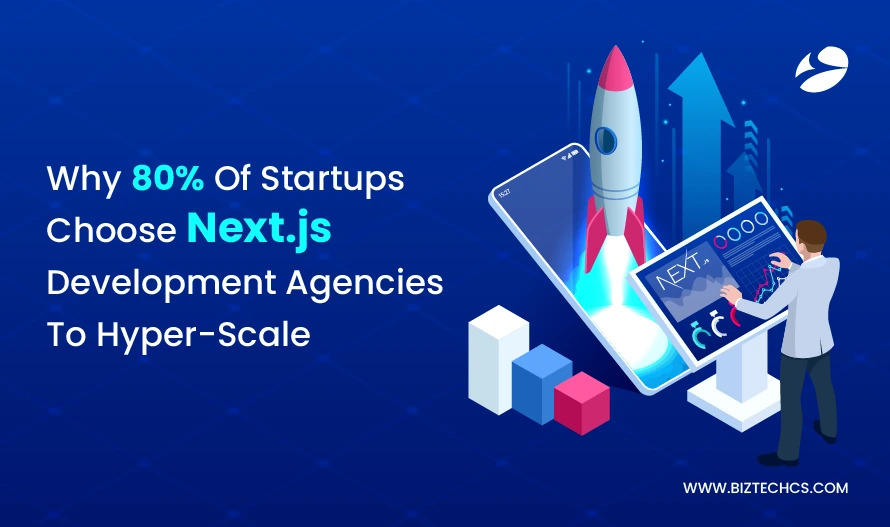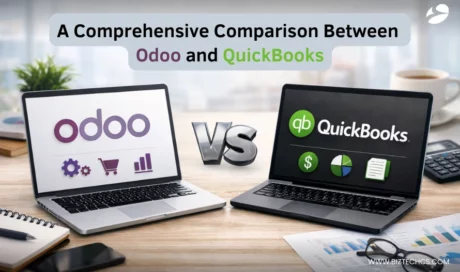2198
Why 80% of Startups Choose Next.js Development Agencies to Hyper-Scale
10 min read
2198
10 min read

Starting a startup is about speed, agility, and growth, but with limited time and resources, the wrong tools and partners will stop you on that path. That’s when Next.js comes in. Next.js is the framework of choice for hungry startups that want immediate speed, performance, and flexibility.
But what’s staggering is that almost 80% of those startups are not even building by themselves in Next.js; they are utilizing development agencies that specialize in Next.js.
In this blog, we will explore why this trend is growing and why fast-moving (hyper-scaling) startups are opting to partner up with a Next.js development agency rather than going solo.
Startups need to do more with less: less capital, less time, and less manpower. This focus drives innovation; however, it creates pressure to get things right the first time, which is what makes working with Next.js development agencies, especially for early-stage companies, a wise decision.
Instead of building a team internally from ground zero (which could take months), startups can tap into a well-established agency team that already has experience with the nuances of Next.js. Here’s why:
This is not outsourcing; this is about gaining a strategic advantage in the early stages of a startup.
Performance isn’t just an option when scaling; it is critical. Startups need websites and applications to keep pace with increased traffic, load reliably and quickly, and allow for an uninterrupted user experience. That’s exactly where Next.js is a game-changer.
Like React, Next.js offers features like automatic code splitting, optimized images, and sensible bundling, improving site speed and responsiveness and reducing load time. It’s actually designed to scale from a one-page MVP to a full product without having to rip out and redo the architecture.
In addition, Next.js provides static site generation (SSG) and server-side rendering (SSR), which provide flexibility in delivering content as desired by users (and search engines) without compromising speed or performance.
Simply put, Next.js makes building fast, scalable applications easier than anything else-startups under pressure should appreciate that.
Back in the day, startups had small marketing budgets. That’s why organic visibility is not only useful—it’s a necessity. Next.js has SEO in mind, providing startups with a welcome kick in search traffic and rankings.
Here’s how Next.js supports startup visibility:
Together, these features form an SEO-friendly foundation that gives startups a fair chance to be seen, even without big ad spends.
What makes Next.js unique is its dual support for SSR and SSG: powerful rendering strategies that matter when considering performance, scalability, and SEO for a startup.
Here are the benefits:
With these features, startups do not have to choose between speed and dynamic functionality; they get speed and dynamic functionality right from the beginning.
Startups often need a wide range of expertise—frontend, backend, DevOps, and UI/UX—to build a solid product. But assembling a whole in-house team is time-consuming, expensive, and often impractical in early stages. This is where Next.js development agencies step in. They offer access to cross-functional, full-stack experts who are already experienced in delivering high-performance applications using Next.js.
That means startups can start building and iterating immediately, without spending months recruiting and onboarding. Next.js development agencies bring deep knowledge of the framework’s architecture, SSR, SSG, API integration, and more—all without the burden of long-term employment contracts.
You get a skilled team that can handle everything from UI components to backend API development, with the flexibility to scale up or down as your needs change. For startups focused on speed and agility, having full-stack talent available on demand can be the difference between launching in three months vs. missing the market window entirely.
Hiring an internal team isn’t just about salaries—it also includes benefits, infrastructure, management time, and long onboarding cycles. For a startup, every dollar counts, and burning budget on fixed overheads can be risky. Working with a Next.js development agency is a smart financial move. Instead of paying for seats, you’re paying for outcomes—features delivered, problems solved, and goals met.
Agencies operate on flexible engagement models, allowing startups to scale resources as needed. Whether building an MVP, scaling traffic, or adding new features post-launch, you can control costs without sacrificing quality. This model gives startups clarity in budgeting and avoids long-term commitments when priorities often shift quickly.
Next.js agencies also help avoid costly technical debt by applying best practices right from the start. In short, they offer both technical and financial efficiency—ideal for startups looking to grow lean, fast, and smart.
You know that time-to-market is everything for a startup. Speed is your biggest advantage when testing an idea, pitching to investors, or entering a competitive space. That is why many startups collaborate with Next.js development agencies to rapidly develop and launch their MVPs.
Next.js is an excellent choice for MVP creation due to hybrid rendering, file-based routing, and native performance optimization. These features facilitate immediate iteration and prototyping without sacrificing performance and scalability. When experienced agencies help, startups can shift from concept to launch in weeks rather than months.
An agency also helps ensure that your MVP is not only functional but also everything an investor needs to see before deciding to give you more funding. Clean code, fast page loads, responsive design, and SEO are all critical factors for impressing users and stakeholders and creating the possibility of early traction, valuable feedback, and ultimately more funding pitches and interest.
In summary, if you want to get an MVP out fast and make a great first impression, Next.js agencies are the best option. They will get your product to market quickly and with a clear purpose.
With the rapid pace of the startup world, speed, flexibility, and thoughtful resource allocations matter. Next.js checks all the boxes—performance, scalability, SEO-friendly, and architected so developers can jump right in. But the magic happens when startups combine a Next.js framework with agencies capable of using the framework fully.
From access to a full-time technical talent without the weight of long-term hiring, keeping costs down, and shipping MVPs in a fraction of flag time, it’s easy to see why 80% of startups prefer this option. A Next.js development agency is about more than just code; it is planning for sustainable and scalable growth.
Whether you are building your first product or scaling up to meet increased demand, the right team to help you do this efficiently could be your smartest decision early on.

Artificial Intelligence (AI)
322
By Nandeep Barochiya

Odoo
393
By Uttam Jain

Artificial Intelligence (AI)
694
By Nandeep Barochiya